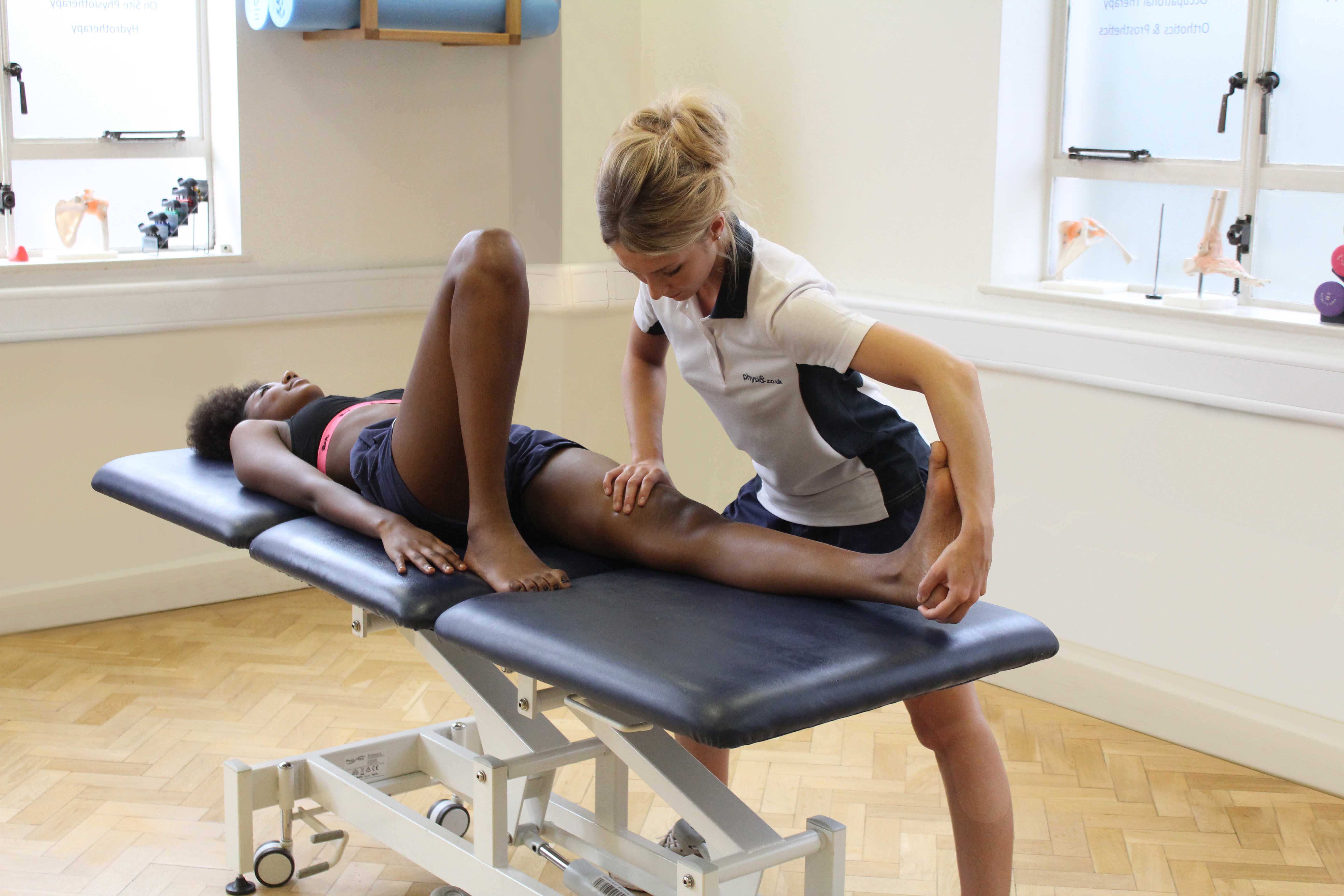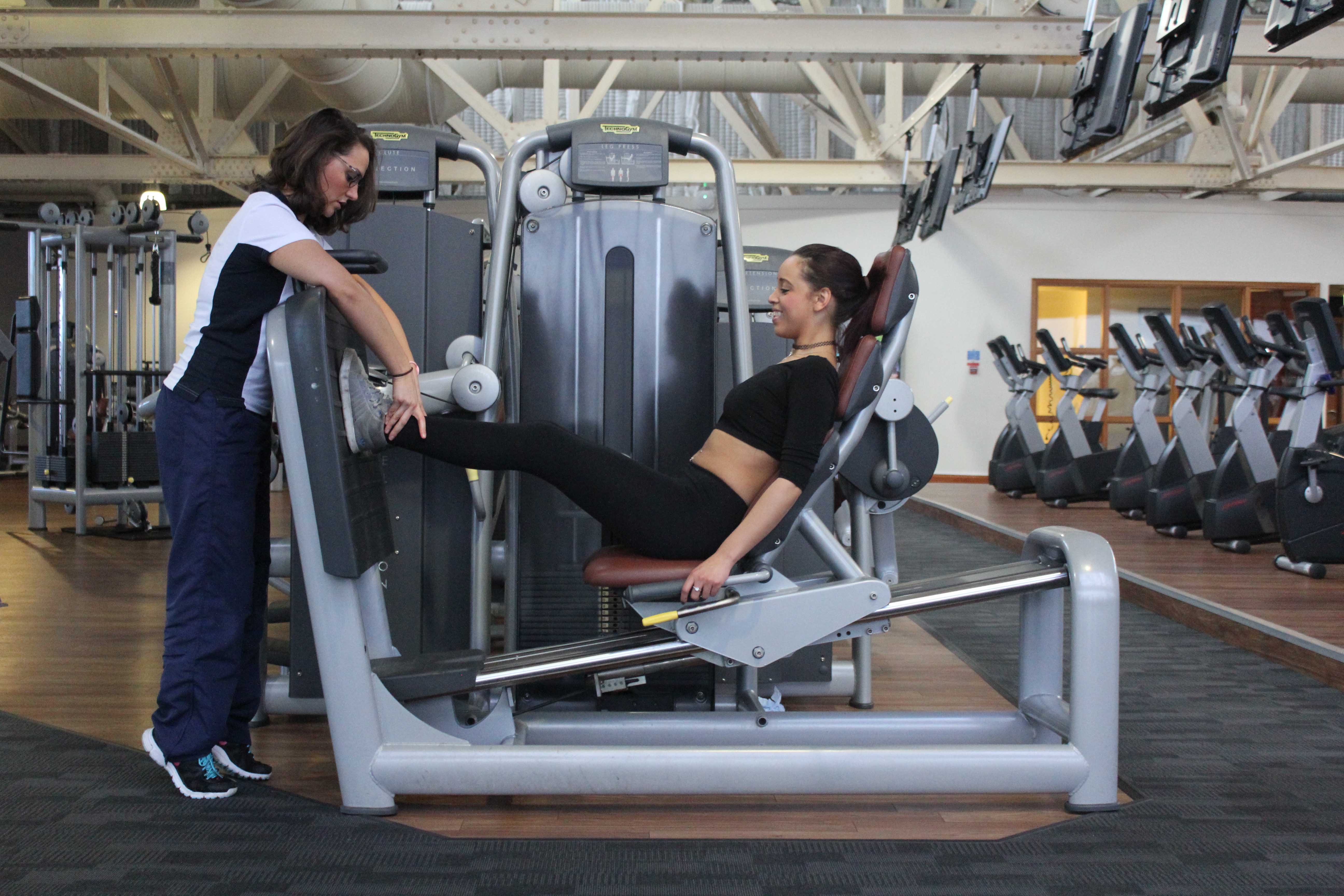What is a knee cartilage injury?
Within the knee there are two C-shaped cartilages (also known as meniscus). The cartilage are the ‘shock absorbers’ of the knee. A knee cartilage injury occurs when one of, or both, of these structures are damaged. It is also commonly known as a meniscal tear or a torn cartilage. Physiotherapy is an excellent treatment for a knee cartilage injury.
How does a knee cartilage injury happen?
A knee cartilage injury most commonly occurs during a twisting movement of the knee. This can happen when changing direction sharply with the foot fixed firmly on the ground. It can also be caused if the knee is hit from the side causing it to twist or buckle. Knee cartilage injuries can often occur in combination with other injuries such as a torn anterior cruciate ligament (ACL), torn medial collateral ligament (MCL) and torn lateral collateral ligament.
 Above: Therapist performing knee assessment
Above: Therapist performing knee assessmentWhat are the symptoms of a knee cartilage injury?
Knee cartilage injuries can present with an array of different symptoms. The injury is usually caused by trauma to the knee in which case you probably remember the exact moment that you sustained the injury. As we get older, however, our knee cartilage gradually weakens and becomes stiff. A knee cartilage injury later in life may, therefore, not have a definitive trauma or onset. The most common sensation felt with a knee cartilage injury is pain within the knee joint. The knee may swell and you may have difficulty walking due to pain. Other symptoms may include:
What should I do if I have torn the cartilage in my knee?
If you suspect that you have a knee cartilage injury you should stop your activity immediately and start initial treatment. The most important time in the initial management of a knee cartilage injury is the first 24–48 hours. Swelling is a necessary for healing to occur; however, too much swelling can delay healing and cause further damage. The RICE regime should be commenced (Rest, Ice, Compression, Elevation) to reduce the blood flow to the knee, thereby reducing the extent of swelling and tissue damage. Rest involves limiting the amount of weight you put through your leg (the use of crutches may be required. Ice should be applied to your knee for 15–20 minutes every 1–2 hours using a bag of frozen peas or crushed ice wrapped in a damp cloth. Compression involves the application of an elastic bandage around your knee. It should be tight but not too tight. Elevation involves lying with your knee resting up on a chair or pillows so that it is above the level of your heart. You should continue with the RICE regime until your initial assessment with a physiotherapist. Ideally this should be within 48 hours of your injury.
What shouldn’t I do if I have torn the cartilage in my knee?
If you have torn the cartilage in your knee then you should not continue with sporting activities until you have received advice from a medical professional.
 Above: Progressive knee strengthening exercises supervised by therapist
Above: Progressive knee strengthening exercises supervised by therapistPhysiotherapy treatment following a knee cartilage injury.
Your physiotherapist can diagnose your injury and advise you on initial treatment. Your physiotherapist will also, if appropriate, refer you to an orthopaedic surgeon. Your physiotherapist will devise an appropriate treatment plan for you. This often consists of intensive rehabilitation before and after your surgery to accelerate your recovery. Exercise programmes can also be developed if it is decided that your knee cartilage is to be managed conservatively (non-operative). Other treatments may include:
Could there be any long-term effects from a knee cartilage injury?
The majority of the cartilage in the knee has a very poor blood supply; therefore, most knee cartilage injuries are unable to heal by themselves. Ongoing problems such as, knee swelling, clicking, locking and giving way are often present. Fortunately it is possible to perform a ‘keyhole’ (or arthroscopic) surgical repair to the knee cartilage. In this relatively minor surgery, the damaged portion is ‘shaved off’. Results are normally very good and full recovery usually takes place within a couple of months.
If other structures, such as knee ligaments, were also damaged in your injury then your recovery may be prolonged further.
To arrange a physiotherapy appointment call Physio.co.uk on 0330 088 7800 or book online.

 0330 088 7800
0330 088 7800

































